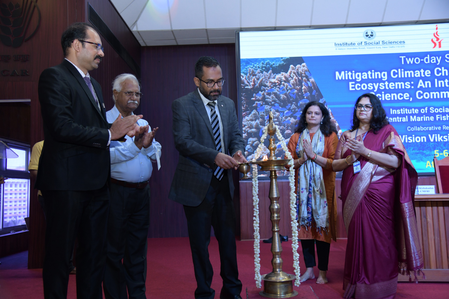
Kochi, Aug 5 (IANS) Marine scientists on Tuesday emphasised that climate change has drastically altered the Lakshadweep ecosystem, significantly reshaping the marine ecosystems and fisheries in the country.
Scientists said this while taking part in a national seminar in Kochi, citing alarming changes in species’ biology, geographic distribution, and environmental conditions.
The two-day seminar titled ‘Mitigating Climate Change Impact on Marine Ecosystems’, jointly organised by the ICAR-Central Marine Fisheries Research Institute (CMFRI) and the Institute of Social Sciences, New Delhi, was sponsored by the Indian Council of Social Science Research (ICSSR).
Inaugurating the seminar, K.R. Sreenath, Director of the Fishery Survey of India, warned of the visible impacts of climate change in India’s marine regions, including coral bleaching in Lakshadweep, posing serious risks to biodiversity and natural coastal defences.
He called for community-based approaches to be central in policy making to ensure local support and long-term sustainability in conservation and adaptation measures.
“In addition to ecological threats, reciprocal US tariffs on seafood exports have economically strained Indian fishing communities,” he added.
He also underscored the urgent need for advanced and accurate models to predict extreme weather and species migration tools critical for sustainable fisheries management and disaster preparedness.
K. Mohammed Koya, Fisheries Development Commissioner, emphasised that climate change has drastically altered the Lakshadweep ecosystem.
“Damage to sea grass beds has been extensive, and proposed seaweed farming in lagoons as a potential solution that not only attracts rare species but also supports local livelihoods,” said Koya.
Koya further pointed out that the central government’s emerging carbon market system could offer incentives for fishers and aquaculture farmers to adopt restorative practices, thus aligning ecological and economic goals.
CMFRI Director Grinson George highlighted a critical shift in fish phenology, the timing of biological events, with commercially important species now maturing at smaller sizes.
“Silver pomfret, for instance, now matures at 280 grams, down from 410 grams. Similar declines in size and fecundity are being observed in coastal prawns, sardines, and mackerels. This threatens reproductive success and future stock recruitment,” said George.
George also pointed to the northward migration of species like the Indian oil sardine, which is expected to continue under future climate scenarios driven by changes in food availability, oceanic upwelling, rainfall patterns, and oxygen levels.
Fishermen are also losing increasing numbers of fishing days each year due to cyclone alerts and extreme weather conditions, he said.
Vinod Sharma, Climate Change Advisor to the Government of Sikkim, observed that India’s coastal shorelines have been changing more rapidly since 2000 due to climate events.
“The Arabian Sea has seen a noticeable rise in cyclone frequency, causing increased saltwater intrusion in vulnerable coastal areas, and this has serious consequences for the health and wellbeing of local communities,” said Sharma.
–IANS
sg/svn



